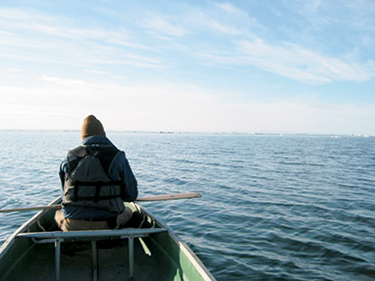Bird fights, jazz riffs lead to top honors for UW graduate

Brooks Miner, ’03.
When Brooks Miner decided to come to the UW in the fall of 1999, the Anchorage native wasn’t sure if he would like the big city. But during his senior year in high school, he had sat in on an evolutionary biology class taught by UW Professor Jon Herron. He decided that the Seattle jazz scene, the chance to study with Herron, and a college experience in an urban environment were good reasons to travel south. It also helped that the UW offered him a Mary Gates Scholarship, which would pay all four years of his tuition.
Four years later, Miner is the 2003 President’s Medalist, the UW’s highest honor for graduating seniors. The award is given every year to a graduating senior with an impressive range of scholarship, not necessarily the one with the highest GPA. Miner’s well-rounded academic background in music and zoology, combined with his 3.92 GPA, set him above the rest.
Despite his strong interest and talent in science, Miner says that jazz was “the only thing I was sure about coming out of high school.” One of the reasons he chose the UW was a chance to study with one of the Northwest’s premier jazz musicians, Music Professor Marc Seales. “There are few jazz programs in the country where an individual such as myself could receive such stellar instruction while pursuing a degree in the natural sciences,” Miner writes. He describes his weekly sessions with Seales as “a personal centerpiece of my college education.”

Brooks Miner, ’03.
Miner says his musical outlet makes his rigorous academic schedule manageable. School is actually harder without jazz, he says. “For me, playing jazz is no mere hobby; it is a lifetime pursuit to which I will always be drawn,” he writes.
But Miner has always known that he doesn’t want to be just a musician. Through a tip by Herron, Miner contacted Professor John Wingfield’s lab in the biology department. There, he learned a graduate student was looking for a research assistant to take to Barrow, Alaska, to study snow buntings, a migratory bird. In Barrow, Miner discovered something not documented elsewhere: Female snow buntings are particularly aggressive toward each other. Miner convinced Wingfield that this finding was worth pursuing. The next summer he went back to Barrow to observe snow buntings and explore his ideas about female-female aggression.
This summer Miner studied migratory birds in Greenland and traveled to Cuba to study Afro-Cuban jazz. This fall he will continue his biological research in Seattle before going to graduate school in evolutionary biology. Ultimately he plans to return to Alaska.